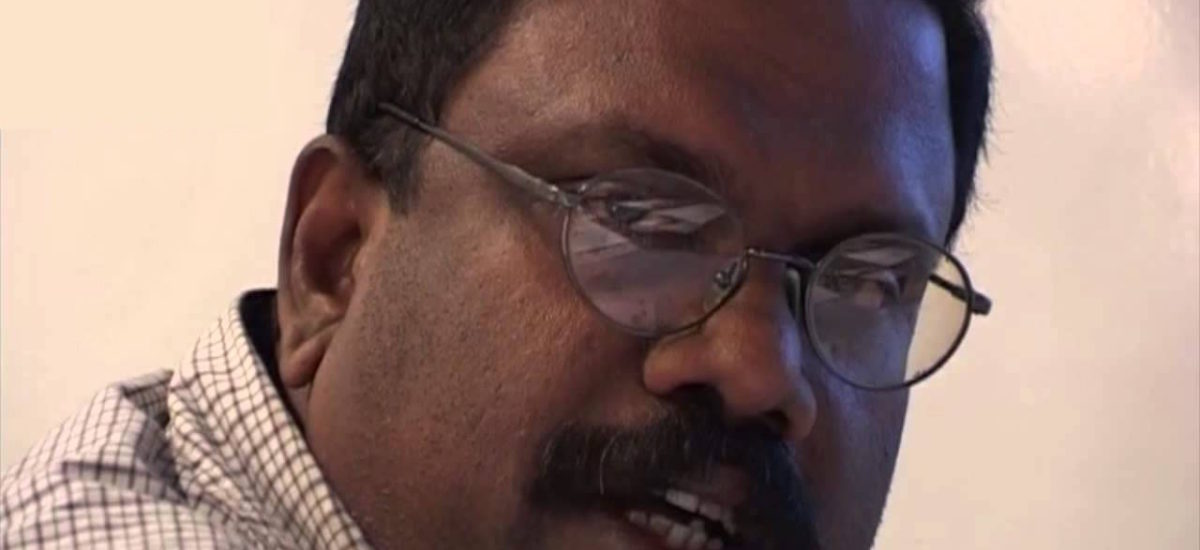Image courtesy Tamilnet
Today’s event focuses on one man. Today morning, there was a protest in Colombo, organized by a coalition of media freedom groups and others, demanding accountability for Sivaram’s murder. It is fitting that events to remember Sivaram are held in both North and South, as he had also worked and lived in South and had many friends in the South.
Although the events today focuses on one man, we can also reflect on broader issues related to free expression, democracy and human rights. I will share brief thoughts on some of these.
The man
Much has been said and written about Sivaram. I have never met him or his family, and have read only few of his writings. So I have little to share about him, and will restrict myself to one thought. Sivaram appears to have benefitted from having had the opportunity to write and publish unpopular views in mainstream English papers based in Colombo. This is well captured in a tribute to Sivaram by Mr. Gamini Weerakoon, editor of “The Island”, who had offered Sivaram a job during which he came to be known as “Taraki”. Despite his (Sivaram’s) views being different or opposed to dominant editorial positions of mainstream media in the South . Mr Weerakoon says he had taken the risk of publishing Sivaram’s views, even when they were “sailing close to the PTA”. Today, it maybe pertinent to question whether Sivaram himself allowed and promoted freedom for dissenting views as an editor? Does Tamil media in the past and today, promote and allow plurality and dissenting views? As we remember Sivaram, it’s good to reflect how much media today – including web media – provide opportunities for views different or opposed to that of its ownership and editorial policy.
Freedom of Expression
A few days ago the newly appointed Secretary to Media Ministry issued an official circular in Sinhalese only, giving “political advice” to journalists, which appear to be in favor of the present government. When he was questioned about this, he had reportedly asked that anyone who needs translations can get it done by themselves. The government also appears to be making efforts to compel news websites to register. The Prime Minister and Ministers have discredited journalists in public. In the North, this month, journalists have been assaulted and threatened, a camera broken and although these incidents have been reported to have been settled amicably, we should not treat such incidents lightly. We certainly have more freedom of expression now than under Rajapakes, but just this month indicates we have a long long way to go.
Impunity
After 11 years, including 475 days of “good governance”, we are no closer to accountability for those who killed Sivaram. That’s also the case for many other journalists who had disappeared, been killed, assaulted, and media institutions that have been subjected to arson and other attacks. Three days from now, on 2nd May, also here in Jaffna, we will remember the killing of Uthyana staff, on eve of World Press Freedom day. Press Freedom day in Sri Lanka will remain bloody red and no amount of rhetorics, discussions and provision of privileges to journalists by the government can take this away. Only genuine structural reforms together with accountability will help erase the stains.
Abductions, Extra-Judicial killings and PTA
Sivaram was abducted and killed extra-judicially. 11 years later, this month, we see an alarming rise in reports of abductions in the North and East. Some of those abducted have been reported to have been found in custody of TID. Fate and whereabouts of others abducted still appear to be unknown. There have also been an wave of arrests under the PTA, a draconian law which this government had promised to repeal, a law which has been widely used to suppress free expression, including my own. When we remember Sivaram, we cannot and should not ignore this context, today, particularly in the North and East of Sri Lanka.
Memorialization
Today we have a monument for journalists killed in Jaffna. We were able to lay flowers, light lamps and have a commemoration, after which, we came here to the historic Jaffna library for this commemorative event. Memorialization is a tradition that successive Sri Lankan governments and armed groups such as the LTTE and JVP had frowned on, restricted and prevented through threats and violence. This government had allowed memorialization to some extent, but had also tried to restrict and crackdown on some memorial events, such as on 18th May last year. But let’s try to push this tradition, while being careful of not glorifying violence and abuses of the past.
Concluding reflections
Sivaram benefitted and used the little bit of space that was available for plural and dissenting views. He paid for dissent with his life. Perhaps a meaningful way for us to pay tribute to him would be to persevere with that tradition of dissent, plurality and defiance, for ourselves and others. Without plural and dissenting views to that of majority and of the powerful, it will be difficult to address root causes of the ethnic conflict, especially grievances and aspirations of numerically minority communities. Welcoming and appreciating plural views and dissent is also crucial to find ways of dealing with war related past abuses, including ones against journalists and media workers. Dissent is also important to address historical injustices within and across communities such as economic injustices, caste, class and gender.

